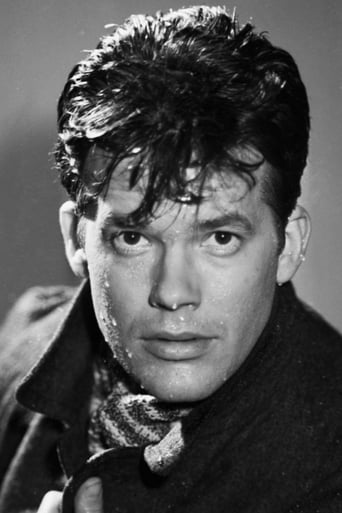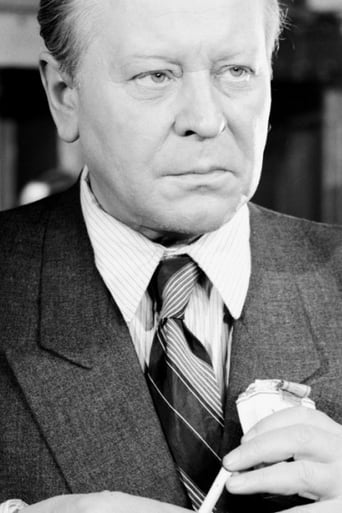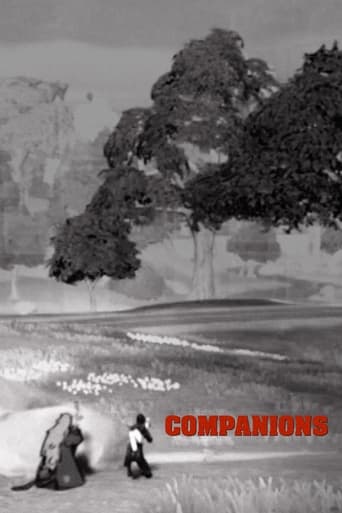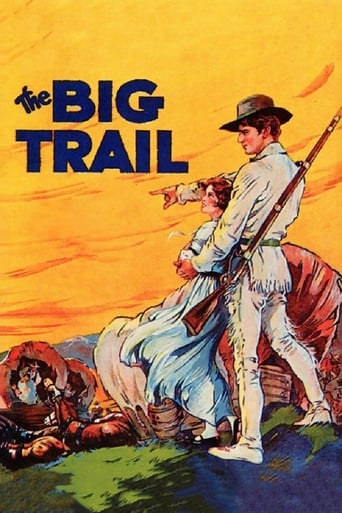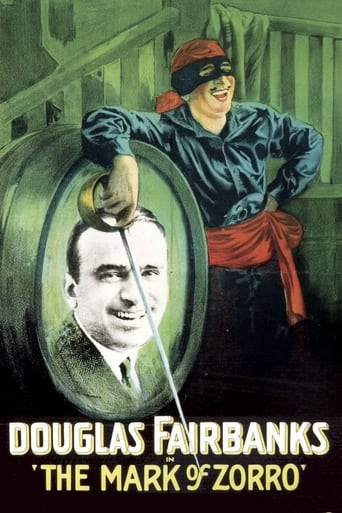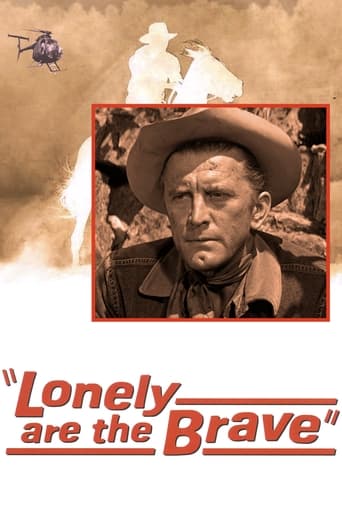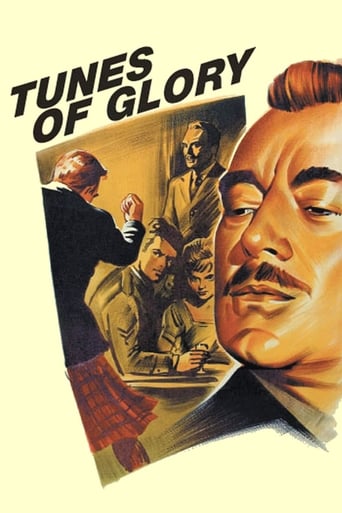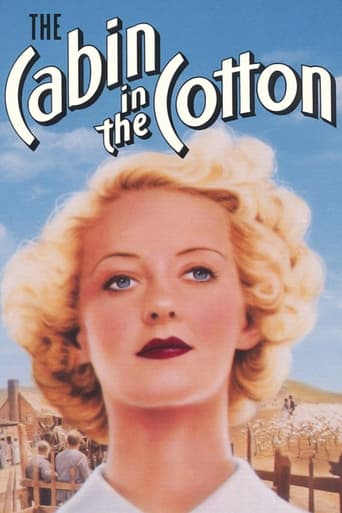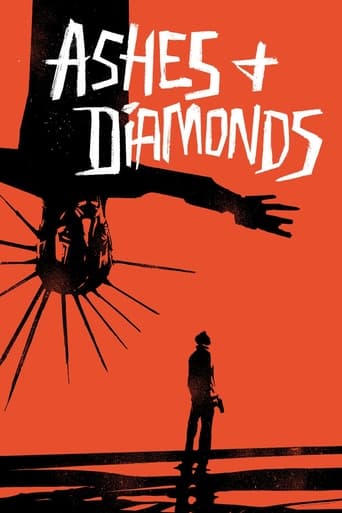
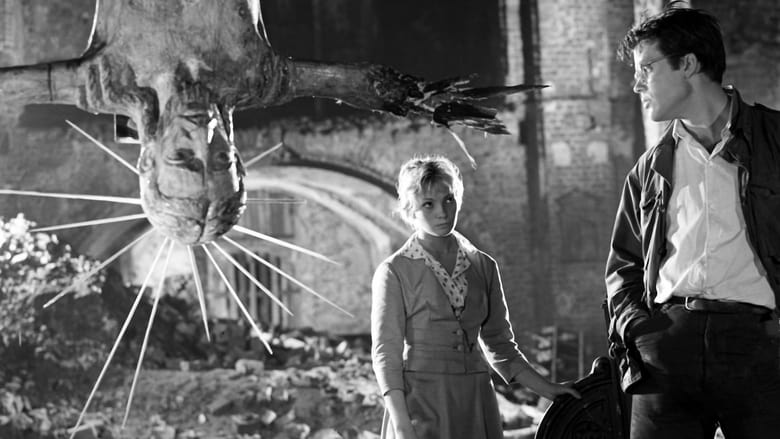
Ashes and Diamonds (1958)
A young academy soldier, Maciek Chelmicki, is ordered to shoot the secretary of the KW PPR. A coincidence causes him to kill someone else. Meeting face to face with his victim, he gets a shock. He faces the necessity of repeating the assassination. He meets Krystyna, a girl working as a barmaid in the restaurant of the "Monopol" hotel. His affection for her makes him even more aware of the senselessness of killing at the end of the war. Loyalty to the oath he took, and thus the obligation to obey the order, tips the scales.
Watch Trailer
Cast


Similar titles
Reviews
It's the end of WWII. Poland has a mix of resistant fighters. With the flood of Soviet troops, the communists are taking over. Maciek (Zbigniew Cybulski) and Andrzej are assigned to kill a local communist leader Szczuka. They mistakenly kill a couple of cement workers instead. Fellow fighters are being rounded up and killed. Maciek is conflicted and falls for beautiful bartender Krystyna.Zbigniew Cybulski wearing the sunglasses has the flair of James Dean. He's the most compelling character in a sea of less compelling characters. I would have liked to stay with him 100% of the time. I'm also unsure about whether James Dean fits in an espionage thriller. That's why I would like to concentrate on his inner struggles and his romance with Krystyna. Zbigniew creates a memorable character in a chaotic world.
With WW2 ending, Poland finds itself in a period of transition and transformation. Millions have been uprooted, the country's infrastructure is in ruins, and there is uncertainty as to whether Russian Communists will move in to occupy the vacuum left by the departing Germans. Enter Maciek, a gunman who works for an anti-Communist faction. He's been tasked with assassinating Polish politicians sympathetic to the local communist party, which is what Andrzej Wajda's "Ashes and Diamonds" finds Maciek doing when it opens. His mission complete, Maciek then disappears to a neighbouring town, eager to learn his next assignment. What he learns, however, is something else: he's assassinated the wrong target. The rest of the film finds Maciek struggling to rationalise the killing of his fellow countrymen. The film's title encapsulates Poland's twin possibilities: destruction or prosperity. Maciek will not accept that the latter necessitates the former.The film plays like a pessimistic, very Eastern European take on "Cassablanca", most of the action taking place in bars, restaurants, shadows and over tables. This is a world rife with spies, communists, anti-communists, double-dealers, mercenaries, power vacuums, red herrings and characters who's loyalties constantly shift. Maciek's no Bogart, though. No cocksure American. He's a confused kid straight out of a 1970s Godard or Fassbinder movie, complete with big sunglasses and a part-time job as a terrorist. Hilariously, Maciek seems to never take off his sunglasses: his world is perpetually pitch black.The film's aesthetic, heavy with a type of symbolism typical of Wajda (upside down Christs, white horses which foreshadow Wajda's "Lotna" etc), tries to capture Maciek's own stormy, crisis of conscience. It's a noirish dark night of the soul. World War 2 has ended, Poland has survived, and yet why does she now find herself again at war? Why now are Poles killing Poles? How can Maciek justify killing his fellowmen? Today such moral dilemmas, as well as killing itself, has long been banalized down to nothingness. It's not that man no longer cares; man cares but does "it" anyway. The film ends with Maciek's own death, his blood stains forming the Polish flag, his body melting away into a field of garbage.Like many of Andrzej Wajda's films during this period, "Ashes and Diamonds" was a giant exercise in smuggling the artist's own political views past state censors. After WW2, Stalin created a communist, Soviet allied Polish state, officially dubbed "The People's Republic of Poland". As a part of the Eastern bloc, works of art in Poland deemed "oppositional" to both the Soviet Union and communism were firmly stamped out. And yet many of Wajda's films - though they tend to do this in a somewhat vague, elliptical way - are heavily critical of Polish politics and his local government's ties with the Soviet Union. Some authors have speculated that Poland's love for rebel archetypes and resistance fighters – local characters mythologised during WW2 - blinded censors to the "Ashes and Diamonds'" overall point: idiots, we're killing ourselves for Uncle Stalin!8.5/10 – "Ashes and Diamonds" is customarily thought of as being the second film in Wajda's "War Trilogy". The other films include "Kanal" (1957) and "A Generation" (1955). Worth two viewings.
This film is set on the last day and night of WWII in Europe. Poland is liberated from the tyranny of Nazi Germany and falls into the hands of Joseph Stalin. At the time the Poles were not sure what this meant but they feared the worst. The end of the war, of course, meant something quite different for Poland than it did for France or England. The "liberation" of Poland was just another invasion and occupation and the Resistance shifted targets from Nazis to Polish communists and in doing so went from heroes of Poland to criminals.The story follows Maciek, a young Resistance fighter. His assignment is to assassinate a Polish Communist leader who is in town for a banquet to celebrate the end of the war and his subsequent promotion. It's a long night with lots of drinking, reminiscence, hopes and fears for the future and the unexpected crises of confidence that conflicts our protagonist, Maciek. He falls for the beautiful young barmaid at the hotel and for the first time sees a different life for himself and questions what he is about to do. A heavy feeling of impending doom hangs over the film as the fates of people and a country are in doubt. Into this the director weaves some comical characters and a tragic romance. Good stuff.The look of the film is very expressionist as opposed to the neorealism which was a common style of directors in Europe at the time. The ideal was American Film Noir which the director was a big fan of – The Asphalt Jungle being his favorite. The entire hotel was built and lit artificially so they could create the look and feel they wanted. And, there were a lot of very artistic, purely visual effects and what some might call overly expressionist scenes: a drunken polonaise at sunrise, an upside down crucifix in a bombed out church, a white horse wandering into the frame in a scene in the hotel courtyard. Beautifully photographed in shadowy black and white, this film succeeds as a work of art on every level.The film is based on a book that depicted the assassination target, Szczuka, as the sympathetic figure. And, really, he's not a bad guy. However the director went the other way and made a minor character in the book (Maciek) the lead player. The role was played by one of the leading young actors in Poland, Zbigniew Cybulski. The director let Cybulski keep his trademark long hair and dark glasses even though he knew no WWII resistance fighter looked like that. Even though the Party watchdogs made sure Maciek's ultimate fate was punctuated (in another overly expressionist scene), the Polish movie going public perceived the film as it was intended and Maciek was seen as the hero. Too late to censor the movie in Poland, they were determined to not let it get out of Poland. They were successful in stopping it from going to Cannes but a Party Minister relented and let it go to the Venice Film Festival, allowing it to be seen "out of competition." It won the Grand Prize anyway, Cybulski became the James Dean of Poland and the Party Minister was fired (at the very least). The film is considered one of the greatest films in Polish cinema. 10/10.
During WWII, two ideologically-opposed factions, the London-directed Home Army and the pro-Soviet People's Army, joined forces to defeat a common enemy, the Nazis. When the war came to an end in May 1945, however, so too did the groups' shaky alliance, and from momentary peace was suddenly sprung a whole new struggle for power. While a new Communist regime began to build its foundations in the shell-shocked Polish cities, the remaining Home Army rebels took to the forests, where they dutifully continued their liberation campaign using guerrilla tactics. If WWII itself is considered necessary – or, if not necessary, then at least justified given the Nazi menace – then this post-War skirmish is the ultimate waste of life, prompting murder on the grounds of mere ideology. In Andrzej Wajda's 'Ashes and Diamonds (1958),' a weary Home Army youth, Maciek (Zbigniew Cybulski), faces an internal conflict between fighting political causes and living a normal life, not coincidentally the same dilemma facing the nation of Poland as the War came to a close.Wajda's film opens with an cold-blooded ambush, in which two concrete factory workers are needlessly gunned down in a case of mistaken identity. These shootings take place at the front steps of a country chapel, and with a child within earshot, highlighting the heartless resolve with which the Home Army rebels carry out their murders. However, despite the pro-Communist climate in which Wajda produced his film, he stops well short of demonising the "enemy" rebels, and, indeed, young Maciek is portrayed as the tragic victim of the story. In fact, the film goes to some length to emphasise the parallels between Maciek and Communist leader Szczuka (Waclaw Zastrzezynski), implying the needlessness of their conflict, and so the tragedy of their fatal opposition: both men fought valiantly against fascist dictatorships (the former in both Spain and Poland), and remember fondly the war comrades who died in pursuit of an ideal that, to both, should now be deemed realised. Instead, Szczuka dies in Maciek's arms as Poland celebrates its liberation.Polish cinema reached its peak in the late 1950s, following the Khrushchev Thaw that saw an ease in Soviet censorship, and Andrzej Wajda was at the forefront of this cinematic New Wave. Jerzy Wójcik's stark black-and-white cinematography is elaborate and beautifully-executed, capturing the main character's claustrophobic isolation using closed sets and a cramped frame. The war itself took many prisoners, but Maciek – ironically a "freedom fighter" – finds his freedom restrained in a less overt manner. Even with the liberation of Poland, Maciek is obligated to continue his blood feud, denied the ordinary happiness offered by a life with pretty bar-maid Krystyna (Ewa Krzyzewska), with whom he spends a night. Cybulski's character squanders most of the film in boisterous, overcrowded surroundings, finding room to move only in fractured moments, such as a late-night stroll through the crumbling town ruins. Even in his death throes, Maciek stumbles through a cluttered wasteland of garbage, ultimately joining the detritus of the twentieth century's most costly conflict.


